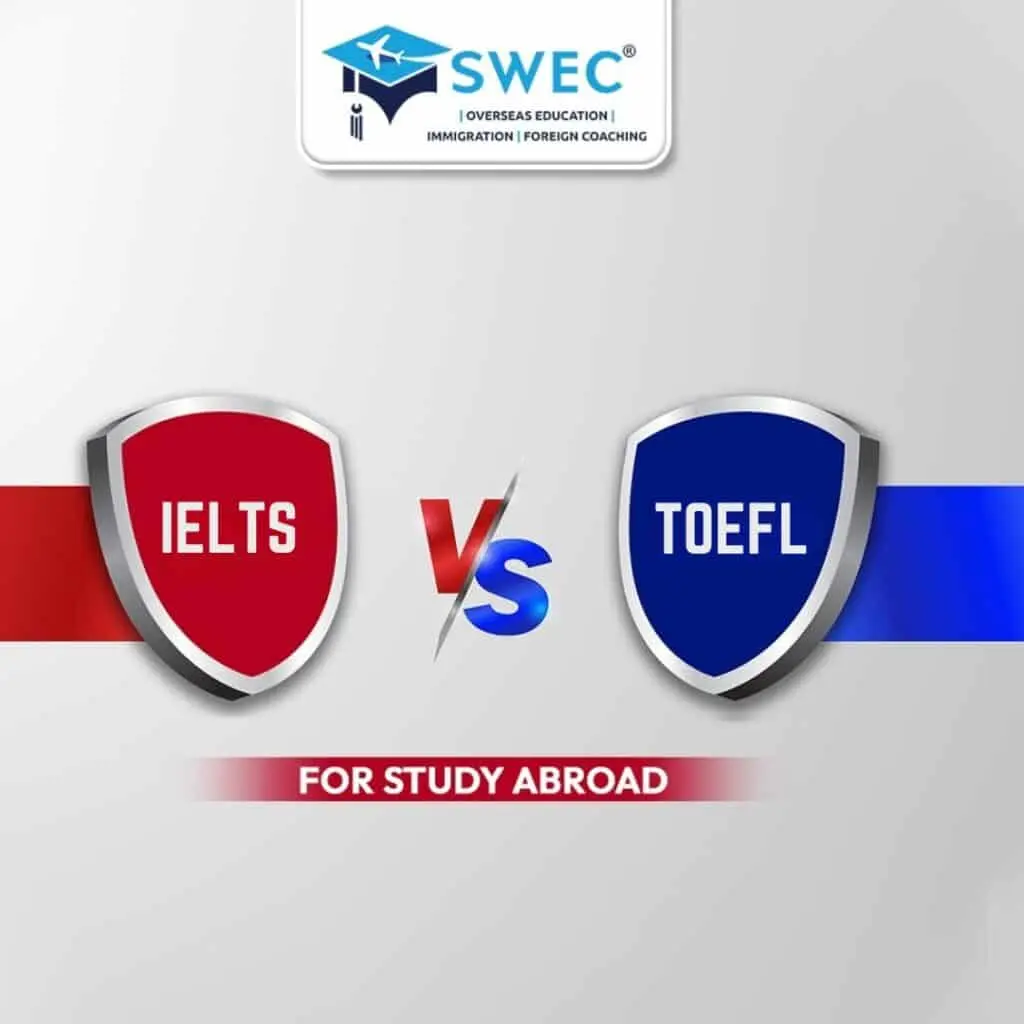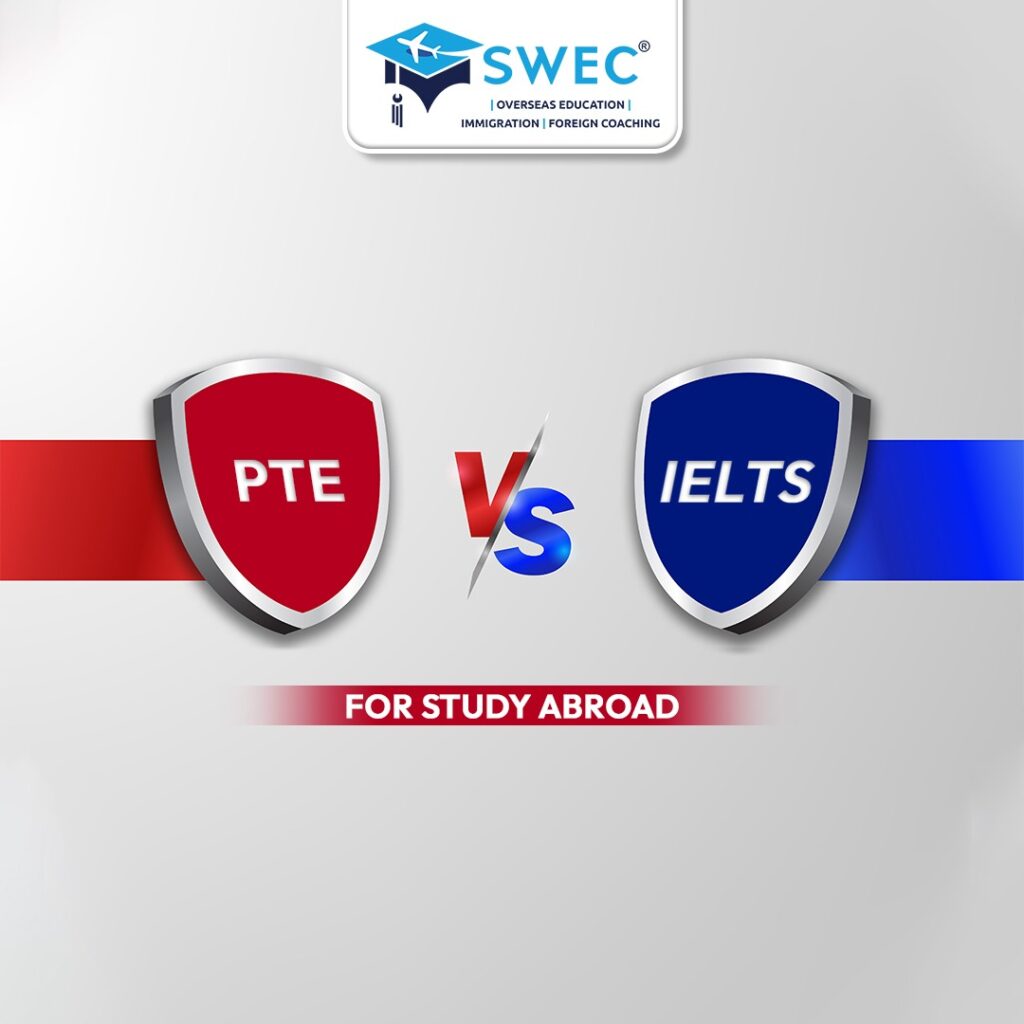
Deciding between the IELTS (International English Language Testing System) and the TOEFL (Test of English as a Foreign Language) can be a pivotal step for non-native English speakers aiming to pursue higher education or work opportunities in English-speaking countries.
Both tests evaluate English proficiency, but they have significant differences in format, scoring, and acceptability. Let’s delve into the details to help you determine which test suits your needs better.
What is IELTS?
There are two versions of the IELTS language test- the IELTS Academic and the IELTS General Training. The two have similar scoring systems as well as the same format. There are four sections- listening, reading, writing, and speaking.
What Is TOEFL?
The TOEFL test is very similar to the IELTS. Unlike the IELTS conducted by ETS, the tests take place on the same day, with breaks between the Listening and Speaking sections. There are four sections as well- listening, speaking, reading, and writing.
What Is The Difference Between IELTS and TOEFL?
| IELTS Academic | TOEFL iBT | |
|---|---|---|
| Method | Paper-based, computer-based, and online | Paper-based, computer-based, and online |
| Length | Under 3 hours | Under 2 hours |
| Scores | 0-9 | 0-120 |
| Results | 3-13 days | 4-13 days |
| Marking | Human examiners and automated marking (machine marking) | Human examiners and automated marking (machine marking) |
| Accepted by | Over 11,000 organizations and institutions worldwide | Over 12,000 universities and institutions worldwide |
Format Of Tests
Although they both test the four skills of listening, reading, writing, and speaking, they do so in different ways:
| IELTS Academic | Questions | TOEFL iBT | Questions | |
| Listening | 30 mins | 40 | 36 mins | 28 |
| Reading | 60 mins | 40 | 35 mins | 20 |
| Writing | 60 mins | 2 tasks | 29 mins | 2 tasks |
| Speaking | 11-14 mins | 3 parts | 16 mins | 4 tasks |
Test Question types
IELTS has various question types. A mix of these will appear in the Listening and Reading tests:
- Multiple choice
- Plan/map/diagram labeling
- Matching
- Sentence completion
- Summary completion
- Short-answer questions
- Form/note/table/flow-chart/summary completion
- True/False/Not given
- Yes/No/Not given
IELTS vs TOEFL – Listening
The listening sections of both the IELTS (International English Language Testing System) and TOEFL (Test of English as a Foreign Language) exams are designed to assess a test taker’s ability to comprehend spoken English in various contexts.
For the IELTS listening section, test takers listen to four recordings of native English speakers and answer a series of questions. The recordings cover a range of topics and vary in accents and speech styles to reflect real-life situations.
Test takers are given time to read the questions before each recording begins and are allowed to write their answers while listening.
On the other hand, the TOEFL listening section includes lectures, classroom discussions, and conversations.
Test takers are required to listen to the recordings and then answer questions based on what they heard. Similar to the IELTS, test takers have some time to review the questions before each recording begins.
One key difference between the two tests is the format of the questions. IELTS typically includes multiple-choice, matching, and short-answer questions, while TOEFL primarily consists of multiple-choice questions.
IELTS vs TOEFL – Reading
The reading sections of both IELTS and TOEFL assess a test taker’s ability to understand written English texts, including academic and non-academic materials.
In the IELTS reading section, test takers are presented with three passages of increasing difficulty and are required to answer a variety of question types such as multiple-choice, True/False/Not Given, and matching headings to paragraphs. The passages cover topics ranging from general interest to academic subjects.
Conversely, the TOEFL reading section includes three to four academic passages followed by comprehension questions. Test takers must demonstrate their ability to understand and analyze information from the passages. Questions on the TOEFL are predominantly multiple-choice.
IELTS vs TOEFL – Writing
Both the IELTS and TOEFL exams have a writing section where test takers are required to express their thoughts and ideas in written English.
In the IELTS writing section, test takers are given two tasks. Task 1 requires test takers to describe visual information, such as graphs or charts, in at least 150 words. Task 2 is an essay task where test takers are asked to respond to a specific argument or problem with a minimum of 250 words.
The TOEFL writing section consists of two tasks as well. The first task is the Integrated Writing task, where test takers must read a passage and listen to a lecture on the same topic, then write a summary of both sources.
The second task is the Independent Writing task, where test takers must write an essay expressing their opinion on a given topic.
IELTS vs TOEFL – Speaking
The speaking sections of the IELTS and TOEFL exams assess a test taker’s ability to communicate verbally in English.
In the IELTS speaking test, there are three parts. Part 1 involves answering questions about familiar topics, Part 2 requires test takers to speak about a given topic for two minutes, and Part 3 involves discussing abstract ideas related to the previous topic.
The TOEFL speaking section comprises four tasks. In Tasks 1 and 2, test takers must express an opinion on a familiar topic and then choose between two options and support their choice.
Tasks 3 and 4 require test takers to read a passage and listen to a lecture, then summarize the information and express an opinion.
IELTS vs TOEFL Scores
IELTS and TOEFL scores are reported differently, but both tests assess English language proficiency.
In the IELTS, test takers receive a band score for each section (Listening, Reading, Writing, and Speaking) ranging from 0 to 9. These band scores are averaged to calculate an overall band score, which also ranges from 0 to 9. Each institution or organization sets its own minimum score requirements.
TOEFL scores are reported on a scale of 0 to 120. Test takers receive scores for each section (Reading, Listening, Speaking, and Writing) on a scale of 0 to 30. Similar to IELTS, institutions set their own score requirements for admission or other purposes.
While both tests provide an indication of English language proficiency, the choice between IELTS and TOEFL often depends on the requirements of the institution or organization the test taker is applying.
Ready to Ace Your English Proficiency Test?
Get personalized coaching for IELTS or TOEFL exams from our experts. Elevate your skills and boost your confidence.
EXAM Results
| IELTS | TOEFL |
|---|---|
| You Get results within 3-4 days | You Get result within 3-4 days |
Cost of IELTS and TOEFL
- The cost of IELTS is approximately Rs 16,250.
- The cost of TOEFL is approximately Rs 13,000.
Which Exam to Choose IELTS or TOEFL?
Choosing between IELTS and TOEFL depends on various factors:
- Purpose: Determine which exam is accepted by the institutions you’re applying to (e.g., universities, employers).
- Format: Consider whether you prefer the paper-based (IELTS) or computer-based (TOEFL) format.
- Skills: Assess your strengths in listening, reading, writing, and speaking to match the exam’s structure.
- Availability: Check the availability of test centers and dates for each exam in your area.
- Cost: Compare the costs of both exams and choose the one that fits your budget.




